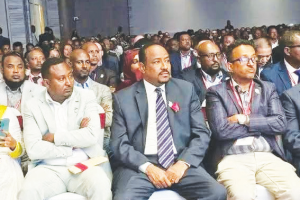
Stories that are started with “Teret Teret” (to mean, story story) and concludes with “Tereten melesu Afen bedabo abisu” (to mean it is your turn to tell the story and reward me for telling you the story), are the most eagerly awaited trend for most young Ethiopian children.
As various writers stated, storytelling is one of the oldest methods of interaction and communication that has been used for millennia to preserve and pass down history, inculcate moral lessons, transmit message, teach what the society expects, aside from entertainment purposes.
Telling and listening stories orally in Ethiopia is a well-established cultural values of the communities which is conducted by everyone, at any time in every place. And, for young children, listening to the stories that are narrated by parents, relatives or older people is the much inspired performance longed with greater interest and attended with much attention.
Particularly, for those residing in rural areas, sitting around a campfire in a circular fashion and narrating and listening to stories is an accustomed trend of the communities; used to transmit historic events, cultivate the mentality of a generation plus portray the values of the society through word of mouth.
Mainly, the stories were used to communicate historical events to children through the use of compelling and inspiring narrations aiming to entice the hearts and minds of children, thereby to instill the message. Consequently, many of Ethiopians have experienced the pleasures of telling and listening to stories and transmit historic events to their young ones.
Most interestingly, some of the stories that are being narrated presented by personifying different animals and the narrators’ voice and actions changed depending on the nature, the status and the character of the incarnated animals; the stories are tantalizing, enjoyable and at the same time unforgettable. Above all, they have power to instill the intended message to the young ones. By doing so, the narrators have enabled to transmit the intended messages to their offspring.
Ababa Tesfaye Sahilu, the renowned Ethiopian children story teller and TV personality is the best model in this regard. The legend is always remembered by millions of Ethiopian children (mostly urban dwellers) for his inspirational stories, acts and performance he had been presenting in TV show, entitled Yelejoch Gize, meaning Kids time.
The words, “Endet nachehu lejoch yezare abebawoch yenege ferewoch. Dehna nachehu lejoch?” to mean “How are you Children, today’s flowers and tomorrow’s fruits!” are still remembered as deeply ingrained in the hearts and minds of Ethiopians.
The legend, through the themes of his stories, creative narration and presentation as well, has enabled to instill sense of good virtues such as morality, honesty, truthfulness and valiance characters in the hearts and minds of Ethiopians.
Indeed, these days the practice of telling and listening stories among the communities, especially urbanities, is disappearing bit by bit due to a number of cases, such as technological advancement, parents’ tight work schedules and individualism.
However, it is not possible to say that the tradition has been entirely jettisoned as in rural parts of the country it is still used to pass on historical events, communicate and teach descendants orally.
Folk tale
A story from Southern Nations Nationalities and Peoples Regional State (SNNPRs) Bena ethnic groups. Bena is one with its own manifestation it values through various features. Bena ethic has rich values that could be shared, today of the plenty and rich stories here is Bena fairytale.
The crocodile and the monkey’s Heart
Narrated by Iyasu Origo
In a certain river there was a small island where the monkey lived, and she was happy because there was a tree which bore very sweet and delicious fruit. A crocodile one day came out of the river and begged her to throw one fruit for him.
She threw it and he ate, and he said it was delicious. “Give me another,” the crocodile asked the monkey, and she threw it to him, and the crocodile took the second fruit to his wife.
“Where did you get this from?” she asked him.“A monkey gave me one. I ate it and brought this for you.” “Let’s go to him. I want to see him,” she said. They went.
“Please give us two fruits,” they asked the monkey, and he threw the fruits to them. Then the wife of the crocodile said, “Why don’t you come to our house? We’ll invite you for a good lunch.”
“No, I can’t go into the river. I’m used to climbing up and down trees.” “Don’t worry. We’ll carry you and nothing will happen to you.” So they took the monkey home.
As the three of them sat down the husband and wife were whispering to each other. “We’ll have lunch now,” the crocodile husband said. “All right, I’ll have lunch with you,” said the monkey.
Then he said, “First, you’ll eat lunch with us, then we’ll eat you for dinner.” “Why will you eat me? Have I done anything wrong? I only gave you the fruits.”
“We’ll eat you because we want your heart which is the source of wisdom. We want to be as clever as you. We only want to eat your heart and throw the rest of your body away, because we have enough meat in the river.”
“Well, so be it. I agree with you if you want wisdom. But I don’t have it with me. I keep it up in the tree. So let’s go there and I’ll give it to you.”
“Are you sure you keep it there?” “Yes, indeed.”
So they went to the island and the monkey climbed the tree and began laughing at them. “How foolish you are to think the monkey lives without a heart.
How can the heart be in the tree outside the body of the monkey? So now, come, climb the tree and get my heart.”
And he went on laughing.
The Ethiopian herald June 10,2020
BY STAFF REPORTER




